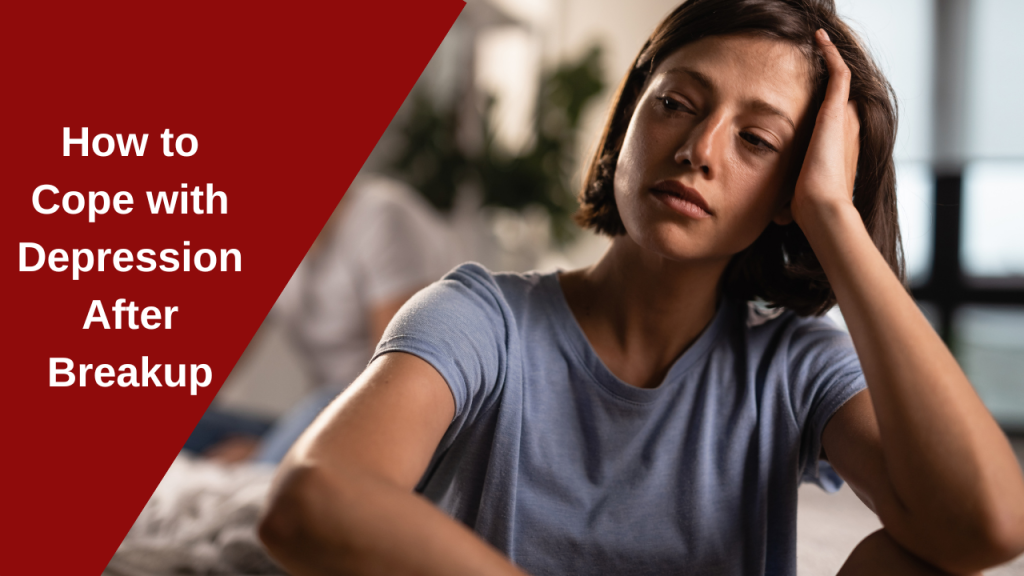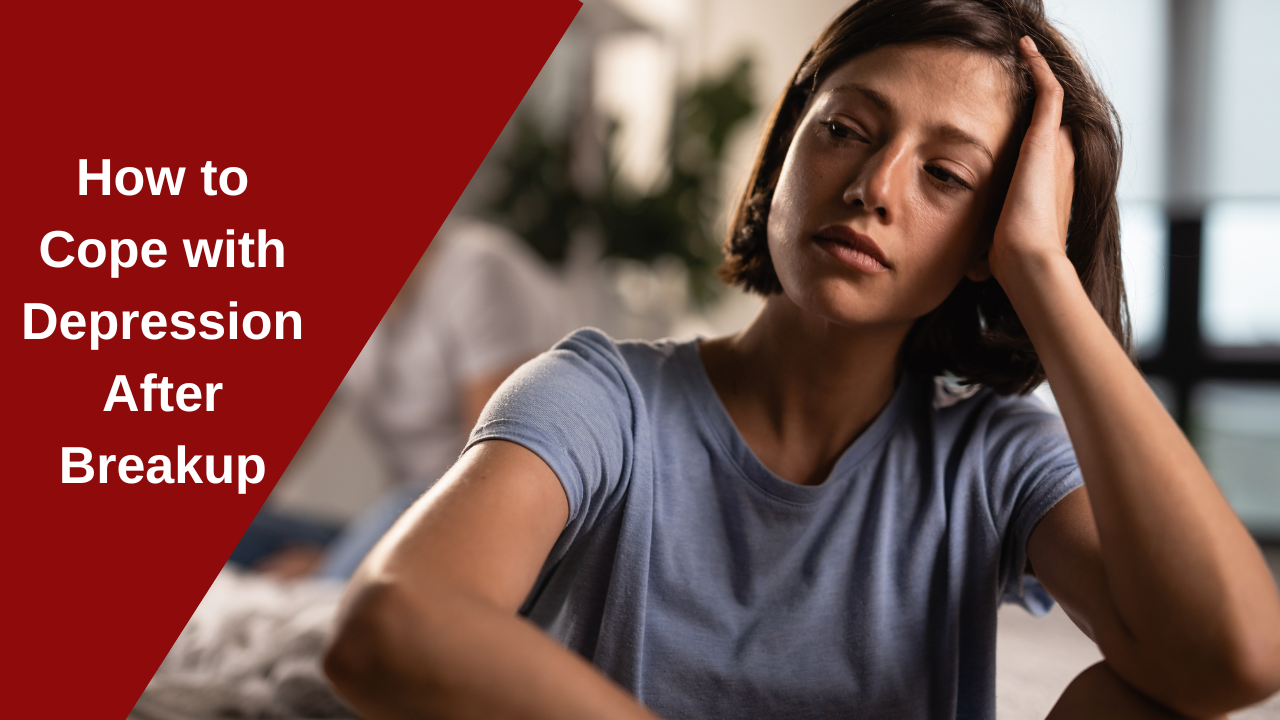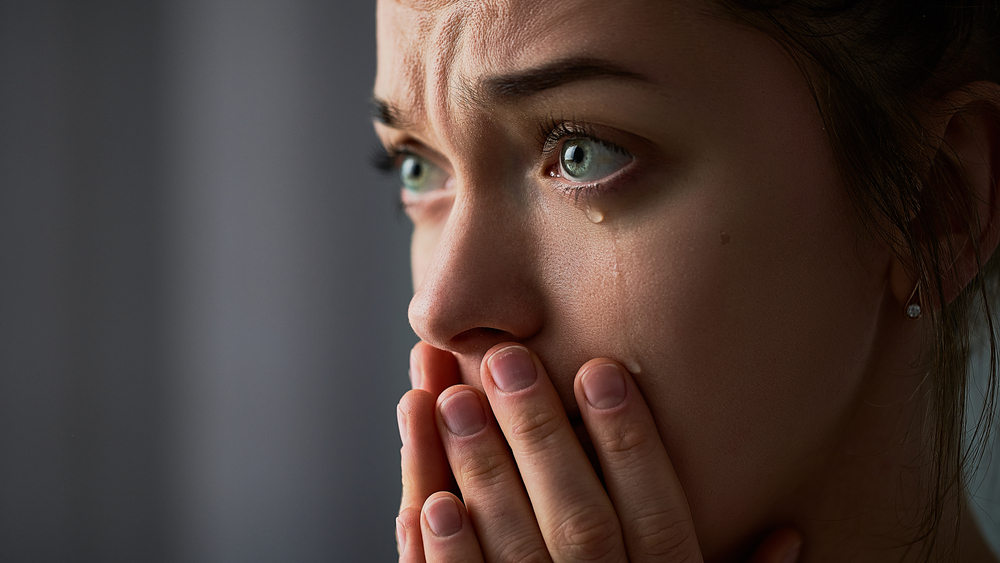Breakups can be emotionally draining, resulting in loss, grief, and even melancholy. Dealing with depression after a breakup can be a challenging road.

Still, it is critical to prioritize your mental health and find practical techniques to manage depression during this time.
This article will examine many strategies and techniques for healing and recovering from post-breakup sadness.
Going through a breakup is an unpleasant event that can hurt your mental health. Recognizing and managing your emotions is critical, as suppressing them might prolong healing.
You can rebuild your sense of self and find happiness by actively working on your emotional healing.
In this article, we have put down information on how to deal with breakup depression.
Table of contents
Can a Divorce Cause Depression?
A breakup can rock the very foundations of our lives, leaving us broken and disoriented. Unsurprisingly, the emotional repercussions of a breakup might be so overpowering that we sink into sadness.
The agony of a broken relationship, dreams, and uncertainty of the future can all contribute to depressive symptoms.
Let’s look at how a breakup can lead to depression and its long-term effects on our health.
Read Also: 15 Deep Conversation Topics
Broken Hearts and Broken Spirits
When a relationship ends, our emotions can feel as if they have been crushed into a million pieces. The person on whom we formerly counted for affection, support, and friendship has vanished from our life.
Following grief can be profound, causing feelings such as sadness, anger, confusion, and a profound sense of loss. Depression can begin to take hold during this susceptible period.
Identity Crisis and Future Plans
A breakup frequently results in losing identity and anxiety about the future. We may have put our time, energy, and dreams into the relationship, which may have shaped our sense of self.
When that link is lost, we must ponder who we are today and what lies ahead. Disruptions to our goals and shattered visions of our future can leave a hole that despair quickly fills.
Isolation and loneliness
The absence of a partner can lead to feelings of loneliness and isolation. We may find ourselves navigating the world without the constant company we formerly had.
The hole left behind can be overpowering, causing feelings of emptiness and a profound yearning for the connection that previously existed. The solitude that accompanies a breakup can deepen depression, exacerbating our agony.
Self-Esteem and Rejection
Breakups can also cause a self-esteem crisis. We may question our worth and worry if we are insufficient for our companion.
Rejection and inadequacy can cast a heavy shadow over our self-esteem, resulting in a downward spiral of negative self-talk and self-doubt.
These self-perceptions can stoke the fires of despair, making it difficult to see our value and find the fortitude to rebuild.
Finding Your Way to Healing
While a breakup can be depressing, realizing that recovery is possible is crucial. It is a path that demands patience, self-care, and the support of loved ones.
Surround yourself with understanding and sympathetic people who can listen and offer relief. Allow yourself to grieve and engage in activities that offer you joy.
Seek professional assistance if necessary since therapy can provide valuable tools and insights for navigating the complicated emotions that develop.
Accepting Hope and Growth
Though the sorrow of a separation might be excruciating, it is critical to maintain optimism. We uncover inner power and tenacity we didn’t know we had when we healed.
The end of one chapter might signal the start of a new, more empowered version of ourselves.
Accept the opportunity for personal development, self-discovery, and the possibility of creating a future filled with love, happiness, and renewed purpose.
What is Depression After a Breakup Symptoms?
After a breakup, feelings of sadness can range from mild to intense. These feelings might sometimes be intense for a short amount of time.
In other circumstances, people may experience a range of mild to severe sadness that fluctuates and lingers for an extended period.
Because emotional reactions to separation vary considerably, knowing whether to seek more help can be challenging. More serious signs of depression after a breakup may include the following:
- Feelings of despair or helplessness
- Weight loss or gain; changes in appetite
- Sleeping excessively or insufficiently Loss of joy and interest
- Feelings of inadequacy
- Sadness, emptiness, or a sense of worthlessness
- Tiredness and a lack of energy
- Feeling empty after a breakup
- Listlessness
- Suicide or death thoughts
Humans experience grief and sadness in reaction to stressful and difficult life situations. Studies have shown breakups have a wide range of substantial effects on people.
Allow yourself time to mourn the relationship’s loss. Mourning, despair, frustration, bargaining, wrath, denial, and remorse are all possible reactions.
It is an adjustment period, so give yourself as much time as you need to feel, process, and heal.
While these feelings are painful, they usually shift over time as you heal and recuperate cognitively, emotionally, and relationally from the breakup.
What Happens When Depression Isn’t Treated?
Depression, if left untreated, can throw a dark shadow over all aspects of a person’s life, eventually destroying their well-being and pleasure.
When depression goes untreated, it can severely affect a person’s mental, emotional, and physical health.
Depression’s weight can become unbearable, affecting relationships, jobs, and overall quality of life.
Let’s look at the severe consequences of untreated depression and the need to seek help.
A Growing Darkness
Untreated depression, like a never-ending storm, can worsen and deepen over time. Sadness and sorrow, once manageable, might become a constant heaviness that permeates every waking minute.
The world has lost its vibrancy, and joy appears to be a distant memory. Depression becomes heavier, hurting motivation, focus, and the capacity to find joy in even the most mundane things.
Relationships that are strained
Depression can affect connections with family and friends, leading to a cycle of isolation and loneliness.
It can be challenging to connect with others when experiencing emotional agony and numbness. Interactions become a sham as sadness conceals actual emotions.
Friends and family members may fail to understand, leaving you frustrated and helpless. Untreated depression can build a schism between people, weakening the critical support structure for recovery.
Workplace Performance Issues
Depression permeates all aspects of life, including work. Once productive, individuals may find it increasingly difficult to concentrate, make decisions, and meet deadlines.
The will to succeed fades, and emotions of worthlessness might pervade their professional identity.
The subsequent drop in work performance may result in negative feedback, missed opportunities, and strained professional relationships, aggravating the sense of hopelessness.
Physical Health Deterioration
The consequences of untreated depression go beyond the domains of the intellect. It infiltrates the body and harms physical wellness. Sleep difficulties, hunger disorders, and fatigue become daily companions.
The immune system deteriorates, rendering one more vulnerable to diseases and infections. As a result of the mental weight, physical discomfort and diseases may appear, compounding the sense of hopelessness.
Suicide and self-harm are more likely.
The increased risk of self-harm and suicide is perhaps the most terrible consequence of untreated depression.
Depression’s heavy veil distorts thoughts, making life seem awful. The person may feel caught in an endless circle of misery, believing there is no way out of the darkness.
Without prompt intervention, the likelihood of self-destructive behaviors and suicide ideation skyrockets, underscoring the crucial need for help.
Rediscovering Light and Hope
Although the consequences of untreated depression can be severe, it is essential to remember that there is always hope for recovery. Seeking assistance is not a show of weakness but instead of strength and self-care.
Depression can be alleviated with expert assistance, compassionate therapy, and suitable treatment. We can traverse the route to recovery together, reconstructing a life full of joy, purpose, and meaningful connections.
How to Overcome Heartbreak and Depression
There are different ways to cope with severe depression after a breakup.
1. Acceptance and Introspection
One of the ways to cope with depression over a breakup is by acceptance and introspection. Accepting the truth of the situation is one of the first steps in dealing with post-breakup sadness.
Feeling various emotions, including anger, sadness, and perplexity, is expected. Allow yourself to mourn the loss of the relationship and your hopes for the future.
Self-reflection is also essential during this time. Take advantage of the chance to understand yourself better, to explore your needs and ambitions, and to find areas for personal improvement.
2. Seeking Help from Family and Friends
Friends and family can make a significant impact during times of emotional turmoil. Reach out to your loved ones and express your emotions to them.
Let them know how they may help you, whether through listening, offering advice, or providing distractions.
Surrounding yourself with a solid support system can help relieve loneliness and bring comfort during this difficult time.
3. Professional Assistance and Therapy
If your depression persists or worsens over time, obtaining professional help is wise. Therapists and counselors are educated to help those experiencing post-breakup sadness and can offer direction and support.
Therapy sessions provide a safe environment to express emotions, gain perspective, and build coping techniques.
Different therapeutic approaches, such as cognitive-behavioral therapy (CBT), can aid in challenging harmful thought patterns and promoting better mental health.
Read Also: 8 Beyond Doubt Signs he wants break up | What to do
4. Healthy Coping Mechanisms and Self-Care
When you are depressed over breakup, apply healthy coping mechanisms. Self-care activities are critical for your general well-being. Make time to focus on your physical, mental, and emotional well-being.
Engage in things that provide you joy and relaxation, such as mindfulness, nature walks, or pursuing hobbies that make you happy.
Furthermore, applying suitable coping methods such as regular exercise, eating a balanced diet, and getting adequate sleep will help substantially with depression symptoms.
5. Negative Thoughts and Emotions Management
Negative thoughts and overpowering emotions can exacerbate depression symptoms. It is critical to create skills for managing and refocusing negative thought patterns.
Practice self-compassion and replace negative self-talk with positive and affirming remarks.
Listening to upbeat music or watching hilarious movies, for example, can help you shift your focus and provide short relief from bad thoughts.
6. Setting Goals and Establishing a New Routine
Thinking of how to be happy after a breakup? start a new routine. After a breakup, establishing a new routine can bring stability and a feeling of purpose. Set and work toward realistic goals for yourself.
Begin by integrating daily routines that promote self-care and personal development. Setting aside time for fitness, exploring a new hobby, or learning a new skill are examples.
You can gradually rebuild your sense of identity and discover happiness again by focusing on personal growth and developing a happy post-breakup lifestyle.
7. Keeping Unhealthy Coping Mechanisms at Bay
When faced with adversity, it is natural to turn to unhealthy coping techniques such as excessive alcohol drinking, substance addiction, or engaging in dangerous behaviors.
While they may provide immediate relief, they can ultimately deteriorate your mental health and impede healing. It’s critical to be aware of these tendencies and look for healthier ways to cope with stress and unhappiness.
8. Patience and time
Moreso, you can get over break-up depression by being patient. It takes time and patience to recover from post-breakup depression. Healing is not a straight line; it is natural to have ups and downs along the journey.
Allow yourself to grieve and experience a range of emotions. Remember that everyone’s healing path is different, and there is no fixed timetable for moving on.
You will eventually discover yourself on the right track with time, self-care, support, and a focus on personal improvement.
Read Also: 29 Undeniable Signs You Are Unofficially Dating
FAQ
Is it natural to feel down after a breakup?
How long does post-breakup melancholy usually last?
Can exercise assist with post-breakup depression?
When should I consider obtaining professional assistance?
Is there any natural treatment for depression following a breakup?
Conclusion
Dealing with depression after a breakup can be a complex and overwhelming process. It is critical to prioritize your mental health and make proactive efforts toward mending it.
You can gradually navigate the rehabilitation process by embracing the reality of the breakup, receiving support from loved ones, obtaining professional aid when necessary, practicing self-care, regulating negative thoughts and emotions, and setting new goals. Remember that mending takes time, so be patient and friendly to yourself.






